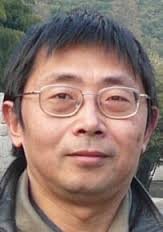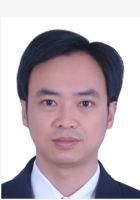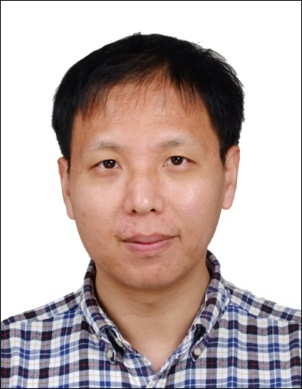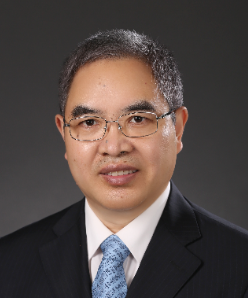
Keynote Speakers
| Prof. Pingyi Fan The Department of Electronic Engineering of Tsinghua University, ChinaBiography: Dr. Pingyi Fan is a professor at the Department of Electronic Engineering at Tsinghua University. He received his Ph.D. degree at the Department of Electronic Engineering of Tsinghua University in 1994. From 1997 to 1999, he visited the Hong Kong University of Science and Technology and the University of Delaware in the United States. He also visited many universities and research institutes in the United States, Europe, Japan, Hong Kong, and Singapore. He has obtained many research grants, including the national 973 Project, 863 Project, the mobile special project and the key R&D program, national natural funds, and international cooperation projects. He has published more than 190 SCI papers (more than 130 IEEE journals), and 4 academic books. He also applied for more than 30 national invention patents and 5 international patents. He won seven best paper awards from international conferences, including IEEE ICC2020 and Globecom 2014, and received the best paper award from IEEE TAOS Technical Committee in 2020, the excellent editor award of IEEE TWC (2009), etc. He has served as the editorial board member of several Journals, including IEEE and MDPI. He is currently the editorial board member of the Open Journal of Mathematical Sciences, the deputy director of China Information Theory Society, the co-chair of China's 6G-ANA TG4, and the chairman of the etwork and Communication Technology Committee of IEEE ChinaSIP. His current research interests are in 6G wireless communication networks and machine learning, semantic information theory and generalized information theory, big data processing theory, intelligent network and system detection, etc. Title: On Federated Learning and Personalized Information Processing Abstract: As a distributed learning architecture with data isolation training and user privacy protection mechanism, federated learning has received extensive attentions from academia and industry. However, federated learning still faces the great challenges of the heterogeneity of multiuser data, the heterogeneity of different agent computing capability and the diversity of communication channels as well as the imbalance and correlation of multi-category data distributions etc. In this talk, we shall introduce a new personalized information processing technique. We first introduce a centralized mode data learning model under the general model, and use it as a benchmark to give the theoretical performance upper bound of the data processing mode under the federal mechanism. Based on the theoretical limit, we formulate an optimization problem for personalized information processing, and use the principle of water-filling in information theory to derive the explicit expression of the optimal data weights. Then database test is used to verify the effectiveness of the theoretical scheme, and some system design principles of theoretical interpretability are also given. Finally, we also point out the potential application scenarios of this new developed approach and its new progresses in Vehicular Edge computing. |
 | Prof. Jinsong Wu University of Chile, Chile Biography: Jinsong Wu was the leading Editor and a co-author of the comprehensive book, entitled “Green Communications: Theoretical Fundamentals, Algorithms, and Applications”, published by CRC Press in September 2012. His co-authored paper, "Big Data Meet Green Challenges: Big Data Toward Green Applications", has won the 2017 IEEE System Journal Best Paper Award. He also has received three best paper awards for IEEE conference papers. He is elected Vice Chair of Technical Activities, IEEE Environmental Engineering Initiative (EEI), a pan-IEEE effort under IEEE Technical Activities Board (TAB) across 25 IEEE Societies, Councils, and Organization Units (OU). He is the founder and current Chair of the Technical Committee on Green Communications and Computing (TCGCC). He is also the co-founder and Vice-Chair of the Technical Committee on Big Data (TCBD). He was the very first proposer of IEEE Green Journals/Transactions (2012). He is the founder and Series Editor of Green Communication and Computing Networks of the IEEE Communications Magazine. He is an Area Editor of IEEE Transactions on Green Communications and Networking. He was an Editor of the IEEE J. Select. Areas on Communications (JSAC) Series on Green Communications and Networking, Editor of IEEE Communications Surveys and Tutorials, Associate Editor of IEEE Systems Journal, Associate Editor of IEEE Access. He was one of the key proposers and a long-term promotor from Green Track to a full green symposium in flagship conferences of the IEEE Communications Society. He opened Big Data Track with general and wide topic coverage in the flagship conferences of the IEEE Communications Society, starting at IEEE Globecom 2016. He was Symposium Co-Chair and Track Vice-Chair on Green Communication Systems and Networks of the Selected Areas in Communications Symposium, IEEE GLOBECOM 2012. He was the leading General Chair at 2013 IEEE International Conference on Green Computing and Communications. He was the Technical Program Committee Chair of the IEEE Online Conference on Green Communications in both 2012 and 2013. He was Track Co-Chair on Green Communications and Networks, IEEE Vehicular Technology Conference 2014 Fall and 2017 Fall. He is the Technical Program Committee Co-Chair in the first IEEE Environmental Engineering Conference, which is the flagship conference of the IEEE Environmental Engineering Initiative. Title: Environmental Sustainability and Intelligence as well as General Green Technologies Abstract: Although the term of green has been often used to refer to energy consumption reduction or energy efficiency by many people and literatures, green actually should refer to environmental sustainability in more general senses. Environmental sustainability issues have been important topics for recent years, which has impacted and will further impact individuals, enterprises, governments, and societies. Environmental sustainability is not simply regarding reducing the amount of waste or using less energy, but relevant to developing processes leading to completely sustainable human society in the future. The long term consequences of the relevant serious issues have not yet been fully forecasted, but it has been generally accepted in many communities that immediate responses are necessary. From 30 November to 12 December 2015, the 21th United Nations Climate Change Conferences of the Parties (COP 21) was held in Paris, France, as the a historical breakthrough and milestone towards securing the future Earth, a global agreement on the reduction of climate change, the text of which represented a consensus of the representatives of more than 193 countries attending it, which was a profound milestone for global environmental sustainability. Nowadays there is another significant tendency on data driven intelligence. This talk would discuss the history, technical issues, challenges, and new trends of data driven environmental sustainability and Intelligence. Further this talk will extend the view to general green technologies. |
 | Prof. Yuhui Deng Jinan University, China Biography: Dr. Yuhui Deng is currently a Professor in the Department of Computer Science, Jinan University. Before that, he was a senior research scientist in EMC Corporation(2008-2009), and a research officer in Cranfield University, United Kingdom (2005-2008). His research interests include cloud computing, data management, big data and computer architecture. He has published over 150 papers including ACM CSUR, ACM TOS, IEEE TPDS, IEEE TC, IEEE TCAD, IEEE TSC,IEEE TCC, IEEE TBD,IEEE TNSM, INFOCOM, ICDCS, DATE, ICCD,MSST,MASCOTS. He holds 40+ national patents. He was on the Storage Challenge Finalist at ACM/IEEE Super Computing (SC07) in 2007. He was on the finalist and awarded of EMC Global Innovation Showcase in 2008. He received best paper award from JISE in 2017, and best journal paper award (IEEE Transactions on Big Data)from the Big Data Technical Committee of IEEE Communications Society in 2019. Title: Heat-Recirculation-Aware Virtual Machine Placement in Cloud Data Centers Abstract: Data centers normally employ cooling systems to maintain the environment temperature below a safety threshold, thus guaranteeing the reliability and lifetime of the IT equipments. However, due to the discrepancies in factors such as data blocks to be processed, locations of computing nodes, the distribution of hot air in a data center becomes uneven, which leads to uneven heat recirculation and increases cooling costs. Currentclouddata centers that consist of thousands of servers are normally virtualized into a large number of VMs, each of which is committed to serve one particular application or customer. In this talk, we discuss how to leverage the mobility of VMs toeliminate theuneven heat recirculation, thus removing the hotspots and reducing the overall energy cost of cloud data centers. |
 | Prof. Xiangjie Kong Zhejiang University of Technology, China Biography: Dr. Xiangjie Kong is currently a Full Professor in the College of Computer Science & Technology, Zhejiang University of Technology (ZJUT), China. Previously, he was an Associate Professor in School of Software, Dalian University of Technology (DUT), China, where he was the Head of the Department of Cyber Engineering. He is the Founding Director of City Science of Social Computing Lab (The CSSC Lab) (http://cssclab.cn/). He is/was on the Editorial Boards of 6 International journals. He has served as the General Co-Chair, Workshop Chair, Publicity Chair or Program Committee Member of over 30 conferences. Dr. Kong has authored/co-authored over 160 scientific papers in international journals and conferences including IEEE TKDE, ACM TKDD, IEEE TNSE, IEEE TII, IEEE TITS, IEEE NETW, IEEE COMMUN MAG, IEEE TVT, IEEE IOJ, IEEE TSMC, IEEE TETC, IEEE TASE, IEEE TCSS, WWWJ, etc.. 5 of his papers is selected as ESI- Hot Paper (Top 1‰), and 18 papers are ESI-Highly Cited Papers (Top 1%). His research has been reported by Nature Index and other medias. He has been invited as Reviewers for numerous prestigious journals including IEEE TKDE, IEEE TMC, IEEE TNNLS, IEEE TNSE, IEEE TII, IEEE IOTJ, IEEE COMMUN MAG, IEEE NETW, IEEE TITS, TCJ, JASIST, etc.. Dr. Kong has authored/co-authored three books (in Chinese). He has contributed to the development of 14 copyrighted software systems and 20 filed patents. He has an h-index of 40 and i10-index of 100, and a total of more than 5800 citations to his work according to Google Scholar. He is named in the2019 and 2020 world’s top 2% of Scientists List published by Stanford University. Dr. Kong received IEEE Vehicular Technology Society 2020 Best Land Transportation Paper Award, and The Natural Science Fund of Zhejiang Province for Distinguished Young Scholars. He has been invited as Keynote Speaker at 2 international conferences, and delivered a number of Invited Talks at international conferences and many universities worldwide. His research interests include big data, network science, and computational social science. He is a Distinguished Member of CCF, a Senior Member of IEEE, a Full Member of Sigma Xi, and a Member of ACM. Title: Spatio-Temporal Graph Learning based Urban Big Data Analysis and Applications Abstract: A modern city is a ternary space that contains the physical world, human society, and information space. Urban big data is the foundation of urban travel intelligence. Based on urban big data, the accurate description of travel information in cities is the premise of forecasting/warning and decision-making assistance. Spatio-temporal graph learning having been extensively used in urban travel profilling in recent years, proves effective for many tasks in real-world applications, such as regression, classification, clustering, matching, and ranking. Spatio-temporal graph learning brings new idea to solve the challenges for smart transportation, improve the efficiency of urban resource utilization, optimize urban management and services, and improve residents' lives quality towards smart cities. This report will explore the research frontiers of spatio-temporal graph learning-based urban travel profiling, traffic data mining and analysis and its application in intelligent transportation systems, and introduce some related work. |
